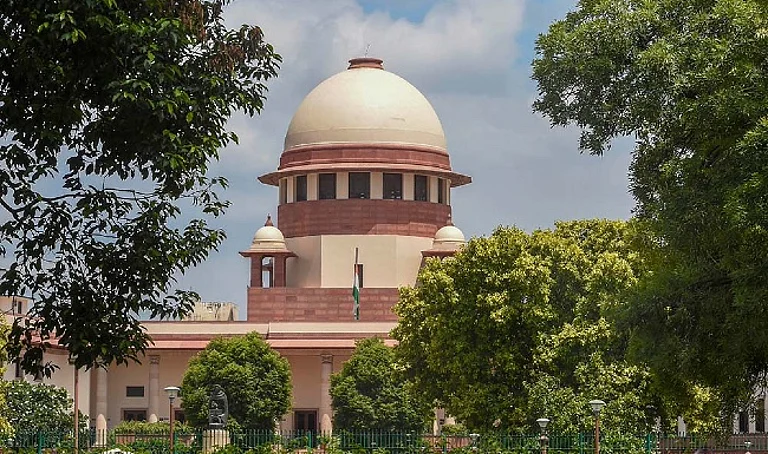
Abhayanand is said to be the brain behind speedy trials and convictions of criminals in Bihar during the Jungle Raj
As per reports, the District Judiciary, in 2010 alone, convicted 14,311 persons
He served as the DGP of Bihar from 2011-2014. He is also a philanthropist who conceptualised Super 30
In 2005, Nitish Kumar, the then Chief Minister of Bihar, summoned Abhayanand, who was the Additional Director General (ADG) of Police and asked him point blank—kya Jungle Raj khatam kiya ja sakta hai? His answer was yes. Abhayanand was offered any amount of money, any law that he wanted and complete freedom to police. He declined all these offers and requested the CM to accept a simple working principle instead—entire policing will be within the ambit of law. Processes were put in place to tackle Jungle Raj in Bihar. The results started showing. Abhayanand is said to be the brain behind speedy trial and convictions of criminals in the state. As per reports, the District Judiciary, in 2010 alone, convicted 14,311 persons in speedy trials, out of which 37 persons were awarded capital punishment and 1,875, life imprisonment. As Abhayanand had envisioned, this instilled the fear of law in the lawbreakers.
He served as the DGP of Bihar from 2011-2014, until his retirement. The author of Unbounded: My Experiments with Law, Physics, Policing and Super 30, he is also a philanthropist who conceptualised Super 30 along with Anand Kumar. It is a free tutorial to coach 30 bright youngsters from underprivileged families of rural Bihar for the IIT entrance test. In this interview, he talks about Jungle Raj, the emergence and legitimisation of Bahubalis, the caste factor as well as the law and order situation.
You were called upon by the Nitish government in 2005 to end the Jungle Raj. Please walk us through that meeting.
This was 2005 end, when the government had just taken charge. The chief minister, who is also the present chief minister, summoned me and asked me point-blank—kya Jungle Raj khatam kiya ja sakta hai? I was an ADG and I gave him a crisp answer: “Yes”. He said: “What do you expect from me? As the head of Executive, I can give you money. As the Head of Legislature, I can give you laws.” I told him money was not needed and laws were aplenty. He wasn’t convinced and said: “Police ka rutba bahal kar dijiye. Sab kuch theek ho jana chahiye.” I replied: “Police ka rutba aur vardi ki gundagardi me bohot antar nahi hota hai. Dono ek hi hai … jo bhi hoga kanoon ke raste se hoga. Aur jo bhi tarika apnaya jayega, wo meri buddhi se chalega.” This is how it started. I chalked out a plan. I would talk to the SPs directly and they knew they had the mandate of the chief minister. Things like speedy trials and bail cancellations worked and started showing results. The basic concept we worked with was—criminals show up with terror, but the public gets affected by the terror of the crime. Now, if criminals commit terror, should the state commit counter-terror? My answer was no. Although state committing counter terror against criminals is rampant in almost every developing country, Bihar was the first experiment where the state said no to counter terror, yet, it showed results.
What was the Jungle Raj? How did you tackle it?
Jungle Raj means no rule of law. Every civilised society runs on laws passed by the Legislature. If a law is not good, then there are courts to pass judgements. Suppose a law is unconstitutional, then the court will tackle it by deciding whether the law is an ultra vires of the Constitution or not. In Jungle Raj, things that happen are not consistent with the laws of the land. Now, police is definitely not an agency to ensure that crime is tackled in a way that is inconsistent with the present law of the land. Police cannot do whatever they want to and the State can’t ask the police to do anything that is against the law of the land. So, the question that came to my mind was, can I do my job as per the laws and still achieve results? Everyone now accepts that in the first phase of the present government—2005-2014—policing did show up and we could tell the world that the police need not be inconsistent with the law to tackle crime.
What used to happen during the Jungle Raj?
I'll give you an example. As a citizen, if somebody’s house is looted, the law says he will go to the police station and lodge an FIR. Then the police will take up the case and go to the place of occurrence and investigate. If the criminals are apprehended, there will be a charge sheet. If the case is false, then there will be another course of action. During Jungle Raj, there were instances after instances where crimes took place but they were never registered or investigated. In fact, we, the senior officers, used to joke that if you come across an FIR, frame it and hang it in your drawing room! During Jungle Raj, even getting an FIR registered was a difficult task.
The Jungle Raj also coincided with the emergence of Bahubalis. What led to the legitimisation of Bahubalis, to the extent that they were allowed to be a part of the electoral process?
It was an aberration. There are so many stories (about Bahubalis), I won't be able to certify those stories personally, but there were too many of them in number for the incidents (involving Bahubalis) to be negated. The incidents must have been there to have gained such currency. It was like the Robin Hood culture. He does become a very important person. He starts believing that he is a replacement for the law of the land. If somebody is told that they are God and if they start believing like God, you can imagine what can happen.
Even in 2025, parties are giving tickets to Bahubalis. There are 22 Bahubali candidates in these elections, cutting across party lines.
The Bahubali concept is basically humans replacing law. But the only Bahubali that can survive in a civilised society is the law.
Jungle Raj is still a part of the system. Even in this election, politicians are mentioning it in their speeches. Where did the slip happen?
The Rule of Law does exist, at least on paper. Just that it’s not effective. As a police officer, I tried to collect some data and the answers were overwhelmingly ridiculous. You take any FIR filed 30 years ago at any police station. If you track it, you will realise that the judicial process started, but did not reach any conclusion. I realised that there are diversions. For instance, if there are eight accused, then each one will follow his own matter and create his own mesh. The process drags on and never ends. I am putting it very succinctly. Judicial processes start in a million matters, but they never end. Legal cases end only when the parties get tired.
Why is there so much mistrust between the people and the police?
When the Constitution was made, the makers put the two services—IAS and the IPS—in the Constitution itself. So, the IPS was not only meant to investigate serious cases but also to keep a check on the sub-inspectors. Certain IPS officers get so thick with the subordinates that they become a part of it. That is one extreme. The other extreme is they will alienate themselves from the subordinates to an extent that they will not be able to deliver under their leadership. So, to police the police, you need to have a very good senior echelon of the police, which is the IPS.
Why is caste such an integral part of every Bihar election?
Caste is an undeniable truth in Bihar. No matter how much I wish to do away with it or imagine that it is not there, it exists. I have learned it the hard way. One has to be very clear in one’s mind that whatever decision one takes will be painted in the light of caste. There, however, are ways of tackling it without getting enmeshed into the caste network.
How does the caste thing work? Because most of the criminal politicians are upper caste …
If politicians belong to X caste, police officers belong to X caste and the criminals also belong to X caste, then that is how the decisions will be taken. It is about who gains what by adopting the caste factor. If it turns out that by helping criminals of a particular caste, the politician loses support of the others, then equations will change.
How did the police function during the Jungle Raj?
I made it clear to the officers that we are not here to kill people. I gave them the freedom to defend themselves in case of an encounter, but killing somebody in custody wasn’t acceptable. When I was the DGP, a man died after he was tortured for three days in a particular police station in Patna district. I followed up, and within 40 days, the officer was dismissed. The message got around.
Do you have any interesting stories from that time?
Politicians always have more information about things going on in their constituencies than the SP or the SHO because they have contacts with the local people. Once, there was a case of dacoity in a village. I rushed to the spot and investigated. One person was named in the FIR. After following due processes, he was arrested. The MLA approached me and said my decision was wrong. I sent an IAS trainee disguised as a civilian to the village. The villagers confessed that they deliberately wrongly accused the person because he was a menace. I realised my mistake. It took me two months to undo my mistake, but I made sure the decision was reversed.
How did you, as a police officer, approach a Bahubali back in the day?
For me, any criminal, Bahubali or not, was a criminal. I wouldn’t pursue any matter based on the name, but with allegation and evidence. I learned this from my father, who was also the DGP of Bihar. He used to tell me that your job is to follow the crime and not the criminal. If you have evidence, pursue it.
You mention in your book that just before your retirement, you asked to be moved to the Home Guards. Jitan Ram Manjhi was the chief minister then. What made you take that decision?
I could see it very clearly that there will not be one chief minister in Bihar, there will be at least three. I was used to dealing with one chief minister as the DGP. We had an equation. We used to discuss things at length. But when the situation changed, I knew that there would be a de jure chief minister, a de facto chief minister and somebody from behind. I couldn't handle that situation.
You also mention that Manjhi was relieved when you sought the transfer. Why was that?
No chief minister can accept a ‘no’ from the DGP. And it was something that I used to do very frequently.
And Nitish Kumar used to listen to you?
Yes, he was open to arguments.
But did Jungle Raj actually end?
The 2010 Assembly elections, when the RJD got only 22 seats put a stamp on the fact that it was the best time politically for the present government. I wasn’t around after 2014, so I don’t know what went wrong after that.
Don't you feel like why are we still in the same place?
Why should I be bothered? I did what I had. I was working as the DGP and I was paid for it. The day I retired in 2014, I bid good bye. I did not even go and meet the chief minister; he did not call me either. I was not expecting it.
What is your plan now?
To live a peaceful life. And I have something to offer. I am teaching physics and mathematics to very poor children at with a purpose of making them get into the IITs.





























